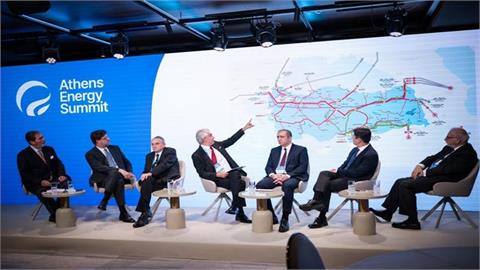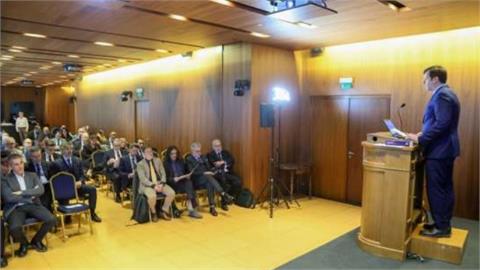Following an invitation by Tim Yeo, chairman of the London based New Nuclear Watch Institute (www.newnuclearwatchinstitute.org), the Executive Director of IENE Costis Stambolis participated in what proved to be a high powered gathering convened by the NNWI to examine the role of nuclear energy as part of Europe's energy mix.
Following an invitation by Tim Yeo, chairman of the London based New Nuclear Watch Institute (www.newnuclearwatchinstitute.org), the Executive Director of IENE Costis Stambolis participated in what proved to be a high powered gathering convened by the NNWI to examine the role of nuclear energy as part of Europe's energy mix. This one day Forum, which took place in the superb offices of legal firm Norton Rose Fulbright overlooking the Thames, attracted some of Europe's top forward looking industry executives and analysts who presented their findings and views on the key role that nuclear energy can play as fears mount on climate change mitigation efforts.
As Tim Yeo, former parliamentarian and minister, and past chairman of the House of Commons Energy and Climate Change Select Committee, said in his opening remarks"the New Nuclear Watch Institute believes that Europe needs both nuclear and renewable energy to meet its challenging targets. Cuts of 90% in greenhouse gas emissions cannot be achieved by 2050 without significant contribution from nuclear, as global concern about climate change will intensify in the next few years. "The London Forum addressed these issues directly focusing on the high costs involved in nuclear plant development and how modern technology and practice can help reduce them. Furthermore it explored the economic benefits of developing new capacity.
A key observation from the Forum's proceedings was that today the prospects for nuclear energy in Europe are uncertain. Despite the EU 2050 Energy Strategy's ambitious greenhouse gas reduction targets the European Commission is ambivalent about the nuclear industry. Apart from France, Britain and Finland the only member states planning new plants are in Central and Eastern Europe. Hence, the presentation by IENE's chairman on the "Role of Nuclear Power in Decarbonising SE Europe" threw much needed light on latest developments in the SEE region and examined the prospects that nuclear power could hold in enhancing further renewables applications and RES grid penetration.
As Costis Stambolis observed in his presentation (see here), today, the existing three nuclear plants in the region (i.e. Kozloduy in Bulgaria, Cernavoda in Romania and Krškoin Croatia/Slovenia) provide constant and sizeable electricity volumes which according to IENE's latest estimates cover some 12% of the region's annual electricity demand (excluding Turkey). If we were to add Hungary's Paks nuclear power plant, the number could reach 16%. In view of the above, nuclear energy has a vital role to play in helping reduce GHGs provided that a plan can soon be put in place to expand existing capacity through the construction of new nuclear plants but also through the upgrade and refurbishment of existing units. Looking ahead to 2030, and in the case of sustainable energy scenario, whereby new nuclear capacity of some 1.2 GW will be added, nuclear’s role could expand further and contribute more than 20% of electricity needs by providing much needed base load.
Concluding his presentation Costis Stambolis noted that if the EC is serious in its quest of achieving much lower emission targets and eventually aim for carbon neutrality by 2050, they have to revise their policies with respect to nuclear power generation and hence include it as one of the main pillars of their long-term energy strategy. This is particularly relevant for SE Europe which at present shows little signs of its will to decarbonize by retiring old and highly polluting lignite plants or stop building new ones as is the case today for a number of countries.




